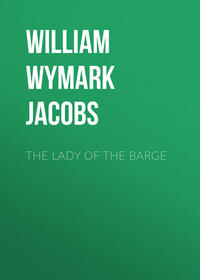 полная версия
полная версияShort Cruises
Mr. Harris skipped across to the clothes and tucked them gleefully under his arm; Mr. Brown secured the boots.
"When he will come out of this stupor I can't say," continued the doctor. "Keep him perfectly quiet and don't let him see a soul."
"Look 'ere—" began Mr. Wragg, in a broken voice.
"As to diet—water," said the doctor, looking round.
"Water?" said Miss Miller, who had come quietly into the room.
"Water," repeated the doctor; "as much as he likes to take, of course. Let me see: to-day is Tuesday. I'll look in on Friday, or Saturday at latest; but till then he must have nothing but clear cold water."
Mr. Harris shot a horrified glance at the bed, which happened just then to creak. "But s'pose he asks for food, sir?" he said, respectfully.
"He mustn't have it," said the other, sharply. "If he is very insistent," he added, turning to the sullen Mr. Wragg, "tell him that he has just had food. He won't know any better, and he will be quite satisfied."
He motioned them out of the room, and then, lowering the blinds, followed downstairs on tiptoe. A murmur of voices, followed by the closing of the front door, sounded from below; and Mr. Gale, getting cautiously out of bed, saw Messrs. Harris and Brown walk up the street talking earnestly. He stole back on tiptoe to the door, and strove in vain to catch the purport of the low-voiced discussion below. Mr. Wragg's voice was raised, but indistinct. Then he fancied that he heard a laugh.
He waited until the door closed behind the doctor, and then went back to bed, to try and think out a situation which was fast becoming mysterious.
He lay in the darkened room until a cheerful clatter of crockery below heralded the approach of tea-time. He heard Miss Miller call her uncle in from the garden, and with some satisfaction heard her pleasant voice engaged in brisk talk. At intervals Mr. Wragg laughed loud and long.
Tea was cleared away, and the long evening dragged along in silence. Uncle and niece were apparently sitting in the garden, but they came in to supper, and later on the fumes of Mr. Wragg's pipe pervaded the house. At ten o'clock he heard footsteps ascending the stairs, and through half-closed eyes saw Mr. Wragg enter the bedroom with a candle.
"Time the pore feller had 'is water," he said to his niece, who remained outside.
"Unless he is still insensible," was the reply.
Mr. Gale, who was feeling both thirsty and hungry, slowly opened his eyes, and fixed them in a vacant stare on Mr. Wragg.
"Where am I?" he inquired, in a faint voice.
"Buckingham Pallis," replied Mr. Wragg, promptly.
Mr. Gale ground his teeth. "How did I come here?" he said, at last.
"The fairies brought you," said Mr. Wragg.
The young man rubbed his eyes and blinked at the candle. "I seem to remember falling," he said, slowly; "has anything happened?"
"One o' the fairies dropped you," said Mr. Wragg, with great readiness; "fortunately, you fell on your head."
A sound suspiciously like a giggle came from the landing and fell heavily on Gale's ears. He closed his eyes and tried to think.
"How did I get into your bedroom, Mr. Wragg?" he inquired, after a long pause.
"Light-'eaded," confided Mr. Wragg to the landing, and significantly tapping his forehead.
"This ain't my bedroom," he said, turning to the invalid. "It's the King's. His Majesty gave up 'is bed at once, direckly he 'eard you was 'urt."
"And he's going to sleep on three chairs in the front parlor—if he can," said a low voice from the landing.
The humor faded from Mr. Wragg's face and was succeeded by an expression of great sourness. "Where is the pore feller's supper?" he inquired. "I don't suppose he can eat anything, but he might try."
He went to the door and a low-voiced colloquy ensued. The rival merits of cold chicken versus steak-pie as an invalid diet were discussed at some length. Finally the voice of Miss Miller insisted on chicken, and a glass of port-wine.
"I'll tell 'im it's chicken and port-wine then," said Mr. Wragg, reappearing with a bedroom jug and a tumbler, which he placed on a small table by the bedside.
"Don't let him eat too much, mind," said the voice from the landing, anxiously.
Mr. Wragg said that he would be careful, and addressing Mr. Gale implored him not to overeat himself. The young man stared at him offensively, and, pretty certain now of the true state of affairs, thought only of escape.
"I feel better," he said, slowly. "I think I will go home."
"Yes, yes," said the other, soothingly.
"If you will fetch my clothes," continued Mr. Gale, "I will go now."
"Clothes!" said Mr. Wragg, in an astonished voice. "Why, you didn't 'ave any."
Mr. Gale sat up suddenly in bed and shook his fist at him. "Look here—" he began, in a choking voice.
"The fairies brought you as you was," continued Mr. Wragg, grinning furiously; "and of all the perfect picturs—"
A series of gasping sobs sounded from the landing, the stairs creaked, and a door slammed violently below. In spite of this precaution the sounds of a maiden in dire distress were distinctly audible.
"You give me my clothes," shouted the now furious Mr. Gale, springing out of bed.
Mr. Wragg drew back. "I'll go and fetch 'em," he said, hastily.
He ran lightly downstairs, and the young man, sitting on the edge of the bed, waited. Ten minutes passed, and he heard Mr. Wragg returning, followed by his niece. He slipped back into bed again.
"It's a pore brain again," he heard, in the unctuous tones which Mr. Wragg appeared to keep for this emergency. "It's clothes he wants now; by and by I suppose it'll be something else. Well, the doctor said we'd got to humor him."
"Poor fellow!" sighed Miss Miller, with a break in her voice.
"See 'ow his face'll light up when he sees them," said her uncle.
He pushed the door open, and after surveying the patient with a benevolent smile triumphantly held up a collar and tie for his inspection and threw them on the bed. Then he disappeared hastily and, closing the door, turned the key in the lock.
"If you want any more chicken or anything," he cried through the door, "ring the bell."
The horrified prisoner heard them pass downstairs again, and, after a glass of water, sat down by the window and tried to think. He got up and tried the door, but it opened inwards, and after a severe onslaught the handle came off in his hand. Tired out at last he went to bed again, and slept fitfully until morning.
Mr. Wragg visited him again after breakfast, but with great foresight only put his head in at the door, while Miss Miller remained outside in case of need. In these circumstances Mr. Gale met his anxious inquiries with a sullen silence, and the other, tired at last of baiting him, turned to go.
"I'll be back soon," he said, with a grin. "I'm just going out to tell folks 'ow you're getting on. There's a lot of 'em anxious."
He was as good as his word, and Mr. Gale, peeping from the window, raged helplessly as little knots of neighbors stood smiling up at the house. Unable to endure it any longer he returned to bed, resolving to wait until night came, and then drop from the window and run home in a blanket.
The smell of dinner was almost painful, but he made no sign. Mr. Wragg in high good humor smoked a pipe after his meal, and then went out again. The house was silent except for the occasional movements of the girl below. Then there was a sudden tap at his door.
"Well?" said Mr. Gale.
The door opened and, hardly able to believe his eyes, he saw his clothes thrown into the room. Hunger was forgotten, and he almost smiled as he hastily dressed himself.
The smile vanished as he thought of the people in the streets, and in a thoughtful fashion he made his way slowly downstairs. The bright face of Miss Miller appeared at the parlor door.
"Better?" she smiled.
Mr. Gale reddened and, drawing himself up stiffly, made no reply.
"That's polite," said the girl, indignantly. "After giving you your clothes, too. What do you think my uncle will say to me? He was going to keep you here till Friday."
Mr. Gale muttered an apology. "I've made a fool of myself," he added.
Miss Miller nodded cheerfully. "Are you hungry?" she inquired.
The other drew himself up again.
"Because there is some nice cold beef left," said the girl, glancing into the room.
Mr. Gale started and, hardly able to believe in his good fortune, followed her inside. In a very short time the cold beef was a thing of the past, and the young man, toying with his beer-glass, sat listening to a lecture on his behavior couched in the severest terms his hostess could devise.
"You'll be the laughing-stock of the place," she concluded.
"I shall go away," he said, gloomily.
"I shouldn't do that," said the girl, with a judicial air; "live it down."
"I shall go away," repeated Mr. Gale, decidedly. "I shall ship for a deep-sea voyage."
Miss Miller sighed. "It's too bad," she said, slowly; "perhaps you wouldn't look so foolish if—"
"If what?" inquired the other, after a long pause.
"If," said Miss Miller, looking down, "if—if—"
Mr. Gale started and trembled violently, as a wild idea, born of her blushes, occurred to him.
"If," he said, in quivering tones, "if—if—"
"Go on," said the girl, softly. "Why, I got as far as that: and you are a man."
Mr. Gale's voice became almost inaudible. "If we got married, do you mean?" he said, at last.
"Married!" exclaimed Miss Miller, starting back a full two inches. "Good gracious! the man is mad after all."
The bitter and loudly expressed opinion of Mr. Wragg when he returned an hour later was that they were both mad.
The Dreamer
Dreams and warnings are things I don't believe in, said the night watchman. The only dream I ever 'ad that come anything like true was once when I dreamt I came in for a fortune, and next morning I found half a crown in the street, which I sold to a man for fourpence. And once, two days arter my missis 'ad dreamt she 'ad spilt a cup of tea down the front of 'er Sunday dress, she spoilt a pot o' paint of mine by sitting in it.
The only other dream I know of that come true happened to the cook of a bark I was aboard of once, called the Southern Belle. He was a silly, pasty-faced sort o' chap, always giving hisself airs about eddication to sailormen who didn't believe in it, and one night, when we was homeward-bound from Sydney, he suddenly sat up in 'is bunk and laughed so loud that he woke us all up.
"Wot's wrong, cookie?" ses one o' the chaps.
"I was dreaming," ses the cook, "such a funny dream. I dreamt old Bill Foster fell out o' the foretop and broke 'is leg."
"Well, wot is there to laugh at in that?" ses old Bill, very sharp.
"It was funny in my dream," ses the cook. "You looked so comic with your leg doubled up under you, you can't think. It would ha' made a cat laugh."
Bill Foster said he'd make 'im laugh the other side of his face if he wasn't careful, and then we went off to sleep agin and forgot all about it.
If you'll believe me, on'y three days arterwards pore Bill did fall out o' the foretop and break his leg. He was surprised, but I never see a man so surprised as the cook was. His eyes was nearly starting out of 'is head, but by the time the other chaps 'ad picked Bill up and asked 'im whether he was hurt, cook 'ad pulled 'imself together agin and was giving himself such airs it was perfectly sickening.
"My dreams always come true," he ses. "It's a kind o' second sight with me. It's a gift, and, being tender-'arted, it worries me terrible sometimes."
He was going on like that, taking credit for a pure accident, when the second officer came up and told 'em to carry Bill below. He was in agony, of course, but he kept 'is presence of mind, and as they passed the cook he gave 'im such a clip on the side of the 'ead as nearly broke it.
"That's for dreaming about me," he ses.
The skipper and the fust officer and most of the hands set 'is leg between them, and arter the skipper 'ad made him wot he called comfortable, but wot Bill called something that I won't soil my ears by repeating, the officers went off and the cook came and sat down by the side o' Bill and talked about his gift.
"I don't talk about it as a rule," he ses, "'cos it frightens people."
"It's a wonderful gift, cookie," ses Charlie Epps.
All of 'em thought the same, not knowing wot a fust-class liar the cook was, and he sat there and lied to 'em till he couldn't 'ardly speak, he was so 'oarse.
"My grandmother was a gypsy," he ses, "and it's in the family. Things that are going to 'appen to people I know come to me in dreams, same as pore Bill's did. It's curious to me sometimes when I look round at you chaps, seeing you going about 'appy and comfortable, and knowing all the time 'orrible things that is going to 'appen to you. Sometimes it gives me the fair shivers."
"Horrible things to us, slushy?" ses Charlie, staring.
"Yes," ses the cook, nodding. "I never was on a ship afore with such a lot of unfortunit men aboard. Never. There's two pore fellers wot'll be dead corpses inside o' six months, sitting 'ere laughing and talking as if they was going to live to ninety. Thank your stars you don't 'ave such dreams."
"Who—who are the two, cookie?" ses Charlie, arter a bit.
"Never mind, Charlie," ses the cook, in a sad voice; "it would do no good if I was to tell you. Nothing can alter it."
"Give us a hint," ses Charlie.
"Well, I'll tell you this much," ses the cook, arter sitting with his 'ead in his 'ands, thinking; "one of 'em is nearly the ugliest man in the fo'c's'le and the other ain't."
O' course, that didn't 'elp 'em much, but it caused a lot of argufying, and the ugliest man aboard, instead o' being grateful, behaved more like a wild beast than a Christian when it was pointed out to him that he was safe.
Arter that dream about Bill, there was no keeping the cook in his place. He 'ad dreams pretty near every night, and talked little bits of 'em in his sleep. Little bits that you couldn't make head nor tail of, and when we asked 'im next morning he'd always shake his 'ead and say, "Never mind." Sometimes he'd mention a chap's name in 'is sleep and make 'im nervous for days.
It was an unlucky v'y'ge that, for some of 'em. About a week arter pore Bill's accident Ted Jones started playing catch-ball with another chap and a empty beer-bottle, and about the fifth chuck Ted caught it with his face. We thought 'e was killed at fust—he made such a noise; but they got 'im down below, and, arter they 'ad picked out as much broken glass as Ted would let 'em, the second officer did 'im up in sticking- plaster and told 'im to keep quiet for an hour or two.
Ted was very proud of 'is looks, and the way he went on was alarming. Fust of all he found fault with the chap 'e was playing with, and then he turned on the cook.
"It's a pity you didn't see that in a dream," he ses, tryin' to sneer, on'y the sticking-plaster was too strong for 'im.
"But I did see it," ses the cook, drawin' 'imself up.
"Wot?" ses Ted, starting.
"I dreamt it night afore last, just exactly as it 'appened," ses the cook, in a offhand way.
"Why didn't you tell me, then?" ses Ted choking.
"It 'ud ha' been no good," ses the cook, smiling and shaking his 'ead.
"Wot I see must 'appen. I on'y see the future, and that must be."
"But you stood there watching me chucking the bottle about," ses Ted, getting out of 'is bunk. "Why didn't you stop me?"
"You don't understand," ses the cook. "If you'd 'ad more eddication—"
He didn't 'ave time to say any more afore Ted was on him, and cookie, being no fighter, 'ad to cook with one eye for the next two or three days. He kept quiet about 'is dreams for some time arter that, but it was no good, because George Hall, wot was a firm believer, gave 'im a licking for not warning 'im of a sprained ankle he got skylarking, and Bob Law took it out of 'im for not telling 'im that he was going to lose 'is suit of shore-going togs at cards.
The only chap that seemed to show any good feeling for the cook was a young feller named Joseph Meek, a steady young chap wot was goin' to be married to old Bill Foster's niece as soon as we got 'ome. Nobody else knew it, but he told the cook all about it on the quiet. He said she was too good for 'im, but, do all he could, he couldn't get her to see it.
"My feelings 'ave changed," he ses.
"P'r'aps they'll change agin," ses the cook, trying to comfort 'im.
Joseph shook his 'ead. "No, I've made up my mind," he ses, very slow. "I'm young yet, and, besides, I can't afford it; but 'ow to get out of it I don't know. Couldn't you 'ave a dream agin it for me?"
"Wot d'ye mean?" ses the cook, firing up. "Do you think I make my dreams up?"
"No, no; cert'inly not," ses Joseph, patting 'im on the shoulder; "but couldn't you do it just for once? 'Ave a dream that me and Emily are killed a few days arter the wedding. Don't say in wot way, 'cos she might think we could avoid it; just dream we are killed. Bill's always been a superstitious man, and since you dreamt about his leg he'd believe anything; and he's that fond of Emily I believe he'd 'ave the wedding put off, at any rate—if I put him up to it."
It took 'im three days and a silver watch-chain to persuade the cook, but he did at last; and one arternoon, when old Bill, who was getting on fust-class, was resting 'is leg in 'is bunk, the cook went below and turned in for a quiet sleep.
For ten minutes he was as peaceful as a lamb, and old Bill, who 'ad been laying in 'is bunk with an eye open watching 'im, was just dropping off 'imself, when the cook began to talk in 'is sleep, and the very fust words made Bill sit up as though something 'ad bit 'im.
"There they go," ses the cook, "Emily Foster and Joseph Meek—and there's old Bill, good old Bill, going to give the bride away. How 'appy they all look, especially Joseph!"
Old Bill put his 'and to his ear and leaned out of his bunk.
"There they go," ses the cook agin; "but wot is that 'orrible black thing with claws that's 'anging over Bill?"
Pore Bill nearly fell out of 'is bunk, but he saved 'imself at the last moment and lay there as pale as death, listening.
"It must be meant for Bill," ses the cook. "Well, pore Bill; he won't know of it, that's one thing. Let's 'ope it'll be sudden."
He lay quiet for some time and then he began again.
"No," he ses, "it isn't Bill; it's Joseph and Emily, stark and stiff, and they've on'y been married a week. 'Ow awful they look! Pore things. Oh! oh! o-oh!"
He woke up with a shiver and began to groan and then 'e sat up in his bunk and saw old Bill leaning out and staring at 'im.
"You've been dreaming, cook," ses Bill, in a trembling voice.
"'Ave I?" ses the cook. "How do you know?"
"About me and my niece," ses Bill; "you was talking in your sleep."
"You oughtn't to 'ave listened," ses the cook, getting out of 'is bunk and going over to 'im. "I 'ope you didn't 'ear all I dreamt. 'Ow much did you hear?"
Bill told 'im, and the cook sat there, shaking his 'ead. "Thank goodness, you didn't 'ear the worst of it," he ses.
"Worst!" ses Bill. "Wot, was there any more of it?"
"Lot's more," ses the cook. "But promise me you won't tell Joseph, Bill. Let 'im be happy while he can; it would on'y make 'im miserable, and it wouldn't do any good."
"I don't know so much about that," ses Bill, thinking about the arguments some of them had 'ad with Ted about the bottle. "Was it arter they was married, cookie, that it 'appened? Are you sure?"
"Certain sure. It was a week arter," ses the cook.
"Very well, then," ses Bill, slapping 'is bad leg by mistake; "if they didn't marry, it couldn't 'appen, could it?"
"Don't talk foolish," ses the cook; "they must marry. I saw it in my dream."
"Well, we'll see," ses Bill. "I'm going to 'ave a quiet talk with Joseph about it, and see wot he ses. I ain't a-going to 'ave my pore gal murdered just to please you and make your dreams come true."
He 'ad a quiet talk with Joseph, but Joseph wouldn't 'ear of it at fust. He said it was all the cook's nonsense, though 'e owned up that it was funny that the cook should know about the wedding and Emily's name, and at last he said that they would put it afore Emily and let her decide.
That was about the last dream the cook had that v'y'ge, although he told old Bill one day that he had 'ad the same dream about Joseph and Emily agin, so that he was quite certain they 'ad got to be married and killed. He wouldn't tell Bill 'ow they was to be killed, because 'e said it would make 'im an old man afore his time; but, of course, he 'ad to say that if they wasn't married the other part couldn't come true. He said that as he 'ad never told 'is dreams before—except in the case of Bill's leg—he couldn't say for certain that they couldn't be prevented by taking care, but p'r'aps, they could; and Bill pointed out to 'im wot a useful man he would be if he could dream and warn people in time.
By the time we got into the London river old Bill's leg was getting on fust-rate, and he got along splendid on a pair of crutches the carpenter 'ad made for him. Him and Joseph and the cook had 'ad a good many talks about the dream, and the old man 'ad invited the cook to come along 'ome with 'em, to be referred to when he told the tale.
"I shall take my opportunity," he ses, "and break it to 'er gentle like.
When I speak to you, you chip in, and not afore. D'ye understand?"
We went into the East India Docks that v'y'ge, and got there early on a lovely summer's evening. Everybody was 'arf crazy at the idea o' going ashore agin, and working as cheerful and as willing as if they liked it. There was a few people standing on the pier-head as we went in, and among 'em several very nice-looking young wimmen.
"My eye, Joseph," ses the cook, who 'ad been staring hard at one of 'em, "there's a fine gal—lively, too. Look 'ere!"
He kissed 'is dirty paw—which is more than I should 'ave liked to 'ave done it if it 'ad been mine—and waved it, and the gal turned round and shook her 'ead at 'im.
"Here, that'll do," ses Joseph, very cross. "That's my gal; that's my Emily."
"Eh?" says the cook. "Well, 'ow was I to know? Besides, you're a-giving of her up."
Joseph didn't answer 'im. He was staring at Emily, and the more he stared the better-looking she seemed to grow. She really was an uncommon nice-looking gal, and more than the cook was struck with her.
"Who's that chap standing alongside of her?" ses the cook.
"It's one o' Bill's sister's lodgers," ses Joseph, who was looking very bad-tempered. "I should like to know wot right he 'as to come 'ere to welcome me 'ome. I don't want 'im."
"P'r'aps he's fond of 'er," ses the cook. "I could be, very easy."
"I'll chuck 'im in the dock if he ain't careful," ses Joseph, turning red in the face.
He waved his 'and to Emily, who didn't 'appen to be looking at the moment, but the lodger waved back in a careless sort of way and then spoke to Emily, and they both waved to old Bill who was standing on his crutches further aft.
By the time the ship was berthed and everything snug it was quite dark, and old Bill didn't know whether to take the cook 'ome with 'im and break the news that night, or wait a bit. He made up his mind at last to get it over and done with, and arter waiting till the cook 'ad cleaned 'imself they got a cab and drove off.
Bert Simmons, the lodger, 'ad to ride on the box, and Bill took up so much room with 'is bad leg that Emily found it more comfortable to sit on Joseph's knee; and by the time they got to the 'ouse he began to see wot a silly mistake he was making.
"Keep that dream o' yours to yourself till I make up my mind," he ses to the cook, while Bill and the cabman were calling each other names.
"Bill's going to speak fust," whispers the cook.
The lodger and Emily 'ad gone inside, and Joseph stood there, fidgeting, while the cabman asked Bill, as a friend, why he 'adn't paid twopence more for his face, and Bill was wasting his time trying to think of something to say to 'urt the cabman's feelings. Then he took Bill by the arm as the cab drove off and told 'im not to say nothing about the dream, because he was going to risk it.









